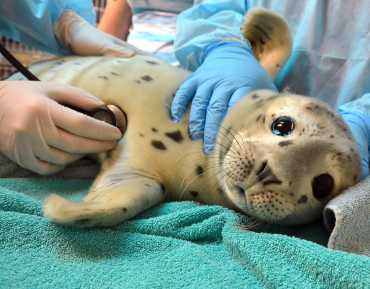
California Sea Lion Jenya Returns Home for the Holidays
- Domoic acid
California sea lion Jenya returns to his ocean home for the holidays after a miraculous recovery
The male sea lion’s release in the Marin Headlands comes after five weeks of intensive rehabilitation for a severe shark bite injury, domoic acid poisoning, and malnutrition.
In the season of giving, the ocean is still an unforgiving environment for marine mammals that call it home. Thankfully for sick and injured California sea lion Jenya, he had a little holiday magic on his side.
After five weeks of intensive rehabilitation for a severe shark bite wound and domoic acid poisoning, response volunteers at The Marine Mammal Center in Sausalito, CA – the largest marine mammal hospital in the world – successfully released Jenya back to the wild last week at Rodeo Beach in the Marin Headlands. His release highlights the more than 440 seal and sea lion patients the Center has cared for this year as an essential business operating during the ongoing pandemic.
“Jenya’s road to recovery was one of the most inspiring patient cases I’ve seen this year,” says Dr. Emily Trumbull, veterinarian at The Marine Mammal Center.
Watching this animal transform back into a feisty, thriving sea lion that’s ready to head home is a testament to the intensive rehabilitative and medical efforts the Center provides sick and injured marine mammals in need.
The subadult male sea lion was rescued by trained responders at San Francisco’s Aquatic Park on November 15 after the Center received public reports of a lethargic sea lion with a large left shoulder wound. Veterinary experts confirmed during the animal’s initial exam that the open wound’s features were consistent with white shark predation and blood samples revealed Jenya was also suffering from domoic acid poisoning -- a condition that, if left untreated, can cause permanent brain damage and death. Domoic acid poisoning primarily attacks the sea lion’s brain, causing lethargy, disorientation and seizures.
Despite the host of physical and neurological health concerns, Jenya’s health steadily improved week over week and he gained back 25 pounds during treatment. After initially clearing the toxin from the animal’s system with a regimen of intramuscular fluids, experts gave Jenya ample time for the bite injury to fully heal and inspected it frequently to avoid the risk infection. Once the sea lion regained full motion and weight distribution on his left front flipper last week, the animal was ready for its second chance.
The public’s continued support this holiday season is critical to provide medical care for California sea lion patients like Jenya.
“Each of these animals presents an opportunity for scientists to better understand the threats they face in the wild and continue to improve rehabilitation efforts for this sentinel species,” says Dr. Trumbull.
The history of domoic acid along the California coast is not new. The Marine Mammal Center was the first organization to discover the neurotoxin in California sea lions in 1998 and has authored or co-authored a dozen scientific papers on its impacts. In recent years, increasing ocean temperatures have led to spikes in domoic acid poisoning occurring year-round instead of seasonally.
This change and its impact on marine mammal species raises the alarm for the Center’s scientists. The documentation of the disease both through samples and treatment is critical to better understanding larger threats to the population at large and human health as well.
The Marine Mammal Center has been on the front lines of marine mammal rescue and rehabilitation for more than 45 years, and has the expertise and tools needed to save these animals. To help the recovery and release of marine mammals like Jenya this holiday season, The Marine Mammal Center kindly asks supporters to text OCEAN to 41444 to donate.
The public can also play an important role in helping the Center respond to seals and sea lions in distress by calling the rescue hotline at 415-289-SEAL (7325).
For more information or to set up an interview on this topic, please contact us at media@tmmc.org.
Yes, I want to save a life!

Yes, I want to save a life!
You’ll be giving sick and injured animals the best possible care at the Center’s state-of-the-art hospital. With your gift today, you are giving a patient a second chance at life in the wild.
See Our Latest News
{"image":"\/Animals\/Wild\/Gray whale\/cropped-images\/two-gray-whales-golden-gate-bridge-shutterstock-0-0-1270-992-1770234810.jpg","alt":"two gray whales under the Golden Gate Bridge","title":"The Marine Mammal Center and San Francisco Harbor Safety Committee Pilot New Vessel Operator Training Program","link_url":"https:\/\/www.marinemammalcenter.org\/news\/the-marine-mammal-center-and-san-francisco-harbor-safety-committee-pilot-new-vessel-operator-training-program","label":"Press Release","date":"2026-02-06 01:00:00"}

The Marine Mammal Center and San Francisco Harbor Safety Committee Pilot New Vessel Operator Training Program
February 6, 2026
Read More{"image":"\/Animals\/Wild\/Bottlenose dolphin\/cropped-images\/dolphinphoto-by-adam-li-c-noaa-0-0-1270-992-1769539954.jpg","alt":"A bottlenose dolphin jumps out of the water.","title":"What\u2019s the Difference Between Dolphins and Porpoises? And Other Animal Trivia","link_url":"https:\/\/www.marinemammalcenter.org\/news\/whats-the-difference-between-dolphins-and-porpoises-and-other-animal-trivia","label":"News Update","date":"2026-01-26 23:00:00"}

What’s the Difference Between Dolphins and Porpoises? And Other Animal Trivia
January 26, 2026
Read More{"image":"\/Animals\/Patients\/Sea otters\/2025\/cropped-images\/so-mooring-release-2-laurie-miller-c-the-marine-mammal-center-USFWS-permit-MA101713-1-147-8-1270-992-1770307740.jpg","alt":"Sea otter - Mooring","title":"Rescue Stories: Southern Sea Otter Mooring Named the 2025 Patient of the Year","link_url":"https:\/\/www.marinemammalcenter.org\/news\/rescue-stories-vote-for-your-favorite-marine-mammal-patient-of-2025","label":"News Update","date":"2026-01-16 10:05:08"}

Rescue Stories: Southern Sea Otter Mooring Named the 2025 Patient of the Year
January 16, 2026
Read More{"image":"\/People\/Action\/Veterinary care\/cropped-images\/Harris_Green turtle_TMMC-0-0-1270-992-1767649941.jpg","alt":"Heather Harris","title":"Seattle Aquarium Awards Dr. Heather Harris With Prestigious Conservation Research Award","link_url":"https:\/\/www.marinemammalcenter.org\/news\/seattle-aquarium-awards-dr-heather-harris-with-prestigious-conservation-research-award","label":"In the News","date":"2026-01-05 04:48:00"}

Seattle Aquarium Awards Dr. Heather Harris With Prestigious Conservation Research Award
January 5, 2026
Read More